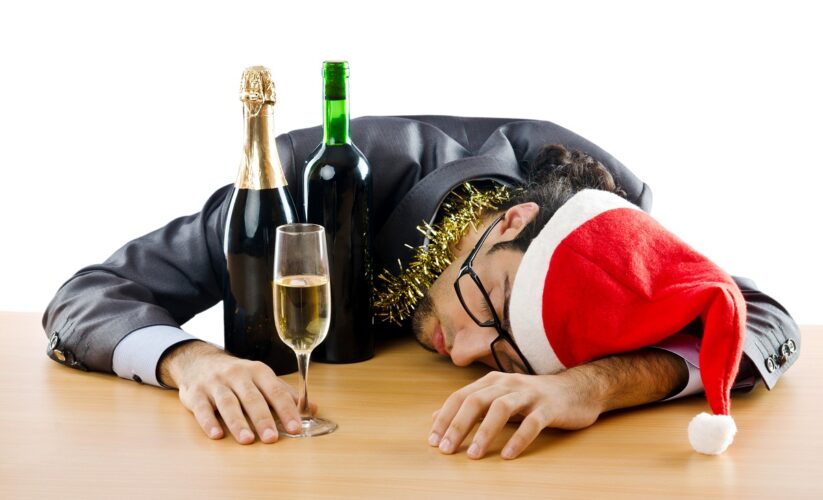
How to manage your hangover the night after Christmas, New Year celebrations
The joyous festivities of Christmas and New Year’s Eve often bring people together to celebrate the end of one year and the beginning of another. However, the merriment sometimes comes at a cost: the dreaded hangover. As the clock strikes midnight and the confetti settles, many find themselves waking up the next morning with a throbbing headache, nausea, and a general sense of malaise. In this comprehensive guide, we will explore effective strategies to help you manage your hangover and bounce back to start the new year on a healthier note.
Understanding the Hangover:
Before diving into remedies, it’s crucial to understand why hangovers occur. Alcohol, a common element in most celebrations, is a diuretic, leading to dehydration. Additionally, it disrupts your sleep cycle, leaving you fatigued and groggy. The metabolism of alcohol also produces toxins that contribute to the unpleasant symptoms associated with hangovers.
Section 1: Prevention is Key
1.1. Moderation:
The best way to manage a hangover is to prevent it in the first place. Moderation is key when it comes to alcohol consumption. Set a limit for yourself before the celebration begins and stick to it. Alternate alcoholic beverages with water to stay hydrated and pace yourself throughout the night.
1.2. Hydration:
Start the night by hydrating properly. Drinking a glass of water before you begin consuming alcohol can help offset dehydration later on. Additionally, intersperse alcoholic beverages with water to maintain hydration levels and lessen the severity of a potential hangover.
Section 2: The Night of Celebration
2.1. Choose Wisely:
Opt for lighter-colored drinks, as they tend to contain fewer congeners, compounds that contribute to hangover symptoms. Clear spirits like vodka or gin may be gentler on your system compared to darker choices like whiskey or red wine.
2.2. Snack Smart:
Eating before and during drinking can slow down alcohol absorption and reduce the impact on your system. Choose snacks rich in protein and healthy fats to help stabilize your blood sugar levels.
2.3. Be Mindful of Mixing:
Different types of alcohol can have varying effects on the body. Avoid mixing too many types of drinks, as this can increase the likelihood and severity of a hangover. Stick to one or two types of beverages throughout the night.
Section 3: The Morning After
3.1. Hydrate Immediately:
Upon waking up, the first thing you should do is reach for a glass of water. Rehydrating your body helps counteract the dehydrating effects of alcohol and can alleviate headaches and fatigue.
3.2. Replenish Electrolytes:
Alcohol depletes essential electrolytes like potassium and magnesium. Consider drinking beverages with electrolytes, such as coconut water or sports drinks, to restore balance to your system.
3.3. Nutrition Matters:
Consuming nutrient-rich foods can provide your body with the energy it needs to recover. Opt for easily digestible options like toast, bananas, or yogurt. These foods can help stabilize blood sugar levels and ease an upset stomach.
Section 4: Holistic Hangover Remedies
4.1. Herbal Teas:
Certain herbal teas, such as ginger or peppermint, can have soothing effects on the digestive system. They may help alleviate nausea and discomfort associated with a hangover.
4.2. Honey:
Natural remedies like honey can provide a gentle energy boost. Add a spoonful to your tea or mix it with water for a refreshing and revitalizing drink.
4.3. Shower Therapy:
A cool or lukewarm shower can invigorate your body and help alleviate some hangover symptoms. Alternating between warm and cool water can improve circulation and provide a sense of relief.
Section 5: Over-the-Counter Relief
5.1. Pain Relievers:
Non-prescription pain relievers like ibuprofen or aspirin may help alleviate headache and muscle pain. However, avoid acetaminophen, as it can interact with alcohol and potentially harm your liver.
5.2. Antacids:
If you’re experiencing stomach discomfort or acid reflux, antacids can provide relief. Choose products that do not contain aspirin, as combining it with alcohol can increase the risk of gastrointestinal bleeding.
Section 6: Rest and Recovery
6.1. Sleep:
Rest is crucial for your body to recover from the effects of alcohol. Aim for a full night’s sleep or take short naps throughout the day to help your body restore itself.
6.2. Gentle Exercise:
While a vigorous workout may be the last thing on your mind, light exercise like a short walk can help boost your mood and promote circulation. Avoid intense physical activity until you feel fully recovered.
Conclusion:
As you bid farewell to the festivities of Christmas and New Year’s Eve, managing a hangover requires a holistic approach. Prevention, hydration, and thoughtful choices during the celebration can significantly impact the severity of a hangover. When the morning after arrives, focus on rehydration, nutrition, and rest to aid your body in its recovery. By incorporating these strategies, you can navigate the post-celebration haze and start the new year feeling refreshed and revitalized. Remember, the key is to celebrate responsibly, ensuring that the joy of the holidays doesn’t get overshadowed by the discomfort of a hangover.







